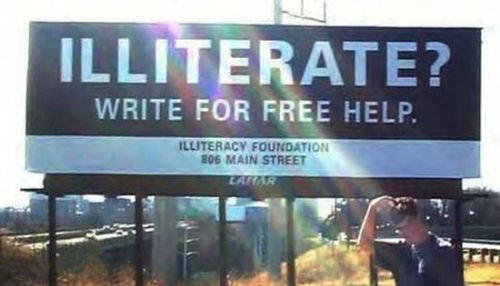Reasonable Accommodation

I shift awkwardly at the front desk, filling out a name tag and ignoring the parade of teenagers coming and going through the large glass doors to my right. There is a certain lethargic restlessness to a rural high school, young people energetically waiting for life to begin and graying public servants passively marking time until retirement. The friendly woman keeping gate, behind the glass buzzes the large metal door.
“You can go down to the conference room now. They are waiting for you.” She says.
“Thank you.” I bleat stepping carefully through the entry, down the dimly lit corridor lined with yellow tile and vaguely optimistic posters, featuring attractive young people encouraging everyone to “make good choices.” For those of us with diagnosed learning disabilities, large institutional school buildings are deeply disturbing places, but I am a professional.
It is 2017. I have been hired to run a transition program for high school students with learning disabilities, preparing for life in the real world. Drawing students from several regional New Hampshire high schools , my job is to provide pre-employment training for IEP students -- resume writing, cover letter writing, explicit instruction in soft skills, even a weekly internship for the students to gain on-the-job experience. Being a starkly funded Department of Education partnership with a private non-profit, I recruit the students, teach the classes, collect the reporting paperwork, even drive the bus. I’ve been working with “at-risk” students since I was still an undergrad, so it all seems fairly straightforward. As a person diagnosed with Dyslexia and ADHD, I have spent the past thirty years working around the field of Special Education, hoping to make a difference in the lives of as many students as possible.
Part of the job is to visit the sending high schools and meet with Special Ed departments to recruit appropriate students. On this particular day, I am meeting with a “Tutor” -- an uncertified para-professional assigned to preside over a room full of neurodivergent students and help them complete their assignments.
I emerge into the windowless conference room, an oblong table surrounded by metal folding chairs, and I am greeted by the Vocational Rehabilitation Case Manager and the Tutor. She is young and energetic, gaining confidence after a few years in the trenches, and we are to discuss the transition program to see if any of her students might be a good fit. We exchanged banal pleasantries and then get around to the subject at hand - an 18 year old dyslexic student, at risk of flunking his senior year because of his homework and attendance records. I present the program as an opportunity for him to earn some Extended Learning Opportunity (ELO) credits and even find a new focus -- working for money. The discussion seems to be going well, but then the Tutor expresses her frank concern.
“He just doesn’t accept reality.” She says. “He seems to live in his own magical reality with no idea what is waiting for him in the real world.” Now part of my role is to evaluate prospective students’ readiness for the program, so I probe a bit deeper.
“Can you give me an example” I query, hoping to better understand this ‘magical world.’”
“Ok.” She exhales. “Last spring he tried to take an EMT course so that he could qualify for some summer job at the YMCA camp.” She confides recalling the details as she speaks. “But then when it came to the written exam to complete the program, he came to me looking to get extra time on the test.” Many students with diagnosed learning disabilities are entitled to extra time under federal law, and he was hoping she would help him advocate for this accommodation.
She explains, “He said he could read the test and knew the answers, but he just needed more time.” Then she pauses looking at us incredulously. “Well, I told him that in the real world, he wasn’t going to have me following him around everywhere to do his homework and help him get around the requirements.” She frowns, “I told him that at some point he was going to have to get real.” She smiles proudly at us before going on. “I told him, that if he was an EMT and out on an emergency call, no one was going to give him extra time.” She went on, “I don’t want people working in emergency services who can't even read a multiple choice test.” She beams proudly, marveling over her powerful personal boundaries.
Now, when I was a younger man, I would have been indignant and started reciting from the ADA, regaling her with tales of friends in the emergency services who read slowly. I would have talked about how many dyslexic people are actually amazing Firefighters and Law Enforcement Officers even Emergency Room Doctors, but I have learned not to rock the boat. I have learned that if I reacted to every insulting statement or ignorant insinuation, I would have lost my mind long ago. I have learned to choose my battles wisely and to focus on the job at hand.
“Well good,” I chirp. “That is just what we do; we help the students create a realistic plan for after they graduate.” Nevertheless, the student in question is not permitted to join the program, because it will interfere with his credit recovery plan.
